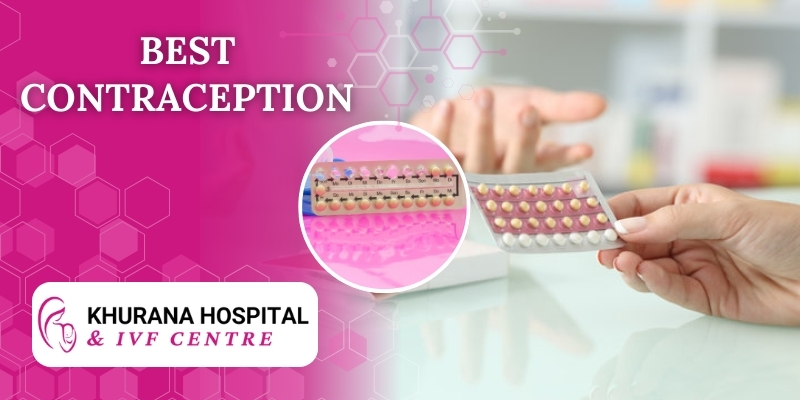Contraception
- Home
- Gynaecology
- Contraception

At Khurana Hospital and IVF Centre, we understand that family planning is a personal and important decision. We offer a wide range of contraception services to help women and couples make informed choices about their reproductive health. Our goal is to provide safe, effective, and convenient contraceptive methods that suit your individual lifestyle and needs.
Understanding Contraception
Contraception, also known as birth control, involves using various methods to prevent pregnancy. It is an essential part of reproductive health, empowering individuals to plan their families, space pregnancies, and maintain their well-being. At Khurana Hospital, we believe in offering a variety of options, each tailored to your health profile, preferences, and long-term family planning goals.
Types of Contraceptive Methods
-
Oral Contraceptives (Birth Control Pills)
- Oral contraceptives are one of the most popular and effective methods of contraception. They work by regulating hormones to prevent ovulation and thus prevent pregnancy. We offer a variety of pills suited to your needs, whether you’re looking for a combination pill or a progestin-only pill.
-
Intrauterine Device (IUD)
- The IUD is a small, T-shaped device inserted into the uterus by a trained healthcare provider. It can be hormonal or copper-based, offering long-term, highly effective contraception. It prevents sperm from reaching the egg and can remain in place for 5 to 10 years, depending on the type.
-
Contraceptive Injections
- Injectable birth control, given every three months, offers a highly effective, long-term solution. The hormone in the injection prevents ovulation and thickens cervical mucus to block sperm. This method is ideal for women who prefer not to take daily pills.
-
Contraceptive Implants
- Small rods are inserted under the skin of the arm, releasing hormones that prevent pregnancy. Implants are highly effective and last for several years, providing continuous, hassle-free protection.
-
Barrier Methods (Condoms, Diaphragms, Cervical Caps)
- These methods physically block sperm from entering the uterus. Condoms, both male and female, are easily accessible, while diaphragms and cervical caps are placed inside the vagina before intercourse. These options also protect against sexually transmitted infections (STIs).
-
Permanent Methods (Sterilization)
- For individuals who are certain they do not want children in the future, sterilization procedures such as tubal ligation for women or vasectomy for men offer permanent solutions. These are minor surgical procedures that are highly effective and irreversible.
-
Emergency Contraception
- Emergency contraception (EC) is used to prevent pregnancy after unprotected sex or contraceptive failure. It is most effective when taken as soon as possible after the event, and our team will guide you in choosing the right method based on your situation.
Benefits of Contraception
-
Prevents Unplanned Pregnancies
Family planning empowers you to choose when and if you want to have children. With the right contraception method, you can prevent unplanned pregnancies and space out your children for better health outcomes. -
Health Benefits
Certain methods, like birth control pills and IUDs, help regulate menstrual cycles, reduce menstrual cramps, and decrease the risk of some reproductive health conditions, such as endometriosis or ovarian cysts. -
Protection Against STIs
Barrier methods like condoms offer protection not only against pregnancy but also against sexually transmitted infections, including HIV.
